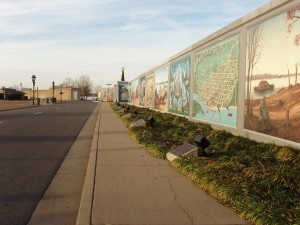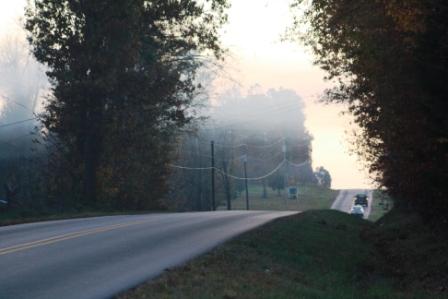Ivan Potter, Futurist/Geographer, Publisher West Kentucky Journal
Wednesday, January 9, 2013 2:04 pm
|
New Federal Rules Will Define West Kentucky's
Jackson Purchase as Frontier
(West Kentucky Journal, January 9, 2013, Clinton, KY) - The urban Washington DC experts are once again busy planning a new name for most of rural America. Their attempt to brand 21st rural and small town America into new federal management zones will be called “Frontier and Remote.”
The Economic Research Service (ERS) of the US Dept. of Agriculture (USDA) will join forces with the Office of Rural Health Policy (ORHP) to (1) gather information on rural areas (2) define frontier areas and (3) establish new rules for dealing with frontier and remote areas for coordination and intergovernmental relations with federal programs and policies.
Frontier and Remote will become known as FAR within the federal community.
The old way of gauging the remoteness of an area was based upon population density (fewer than six people per square mile) and classified by counties. In this new model, county qualifiers are being replaced with (1) using square kilometers as the measurement of population density, and (2) defining remoteness by travel time (not distance) from various population centers.
Federal planners are turning more to zip code geography rather then the old tried and true county lines for refining how frontier and remote will work in each state.
All eight counties of the Jackson Purchase will become listed as Frontier and Remote for federal planning purposes. Forty five zip codes make up this new West Kentucky designation (see map).
A major factor for this new classification is the rule that the area is more than an hour’s drive from a city of 50,000 or more population. No more just straight line air distance from rural to urban core, but rather the time it takes to travel by car by roads to population center will be the standard for Frontier status.
For most rural areas travel from point A to point B involves traveling on a aging system of two lane highways that are in need of repair. It takes longer to go anywhere. Access to four lane superhighways is limited at best or in many areas, non-existence.
If left unchallenged, these new rules will be another series of barriers that rural America and small town America will have to fight over in order to survive the 21sr Century.
An example of how this will impact rural areas is the case of the far western part of Kentucky call Jackson Purchase. The area is so named because General Andrew Jackson purchased the area from the Chickasaw Indian nation in 1818.
Jackson Purchase’s largest cities are Paducah, (pop. 37,000) and Murray (pop. 15,000). Overall, the Purchase is rural to the west along the Mississippi River, as in large farms, with more urban communities closer to the east along Kentucky and Barkley Lakes and the Ohio River.
 With a new image of Frontier status, new business may want to avoid any new development in the region. Most national chains look for an urban center of 50,000. This will damage any attempts to bring in stores such as Target and Macys. New chain restaurants will also review hard any attempt to move or expand into this area.
With a new image of Frontier status, new business may want to avoid any new development in the region. Most national chains look for an urban center of 50,000. This will damage any attempts to bring in stores such as Target and Macys. New chain restaurants will also review hard any attempt to move or expand into this area.
Corporate headquarters and international business will take longer to decide if this area is worth their investments. But the most damaging of all potential loss of new investments will come from the retirement community.
Within a four hour driving time radius of Hickman County, Kentucky (borders the Mississippi River) are six million people in and around St, Louis, Nashville and Memphis. It is estimated by AARP that some 100,000 of these people want to retire into rural areas with access to quality water recreation and small towns.
This is good news for the future of the Jackson Purchase. However, if the Frontier status brand is allowed to stand, then there is a fear that many people will not retire into this area due to media stories of local communities unable to afford the most basic of health care, ambulance services. Without proper ambulance services, many would-be retirees will bring into question the entire health care delivery system within a frontier region of rural America.
As is the situation for policy development, trying to define what the term “rural America” means has always (at least since 1968) been a problem for federal and state leaders.
There needs to be more discussion on how and where the digital age has been blocked from emerging in and throughout rural America.
New satellite access, the promise of digital internet ready plasma large screen TV sets, and Google TV, which combines fiber and cable have the potential to reinvent rural America. Access to the same amenities enjoyed by urban centers could transform rural areas into unique cultural centers for millions of Americans who want to escape urban life.
The answer is that rural America must become much more aggressive in educating urban masses on the worth of balanced growth. All American mega-cit
Rural areas produce clean air, fresh food, fiber, and have great reserves of fresh water. Great spaces are the framework in which rural cultures exist.
Urban. Rural. Which one for America in this new century?
Here’s a thought, why not have both in a new commitment to balanced growth based upon a common sense national policy. It is hoped that any new policy like FAR will be flexible enough to seek new opportunities for job, cultural, healthy living and economic sustainability.
A national rural policy that doesn’t make sense will hasten the hour in which our national urban policies no longer can function. Without the land, water, food, air, there can be no great civilization of urban tribes.
